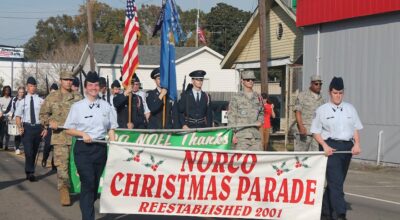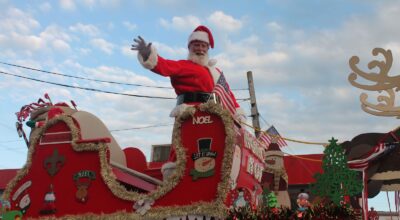The Hidden History of Louisiana’s Jazz Age released
Published 8:30 am Sunday, January 15, 2023
|
Getting your Trinity Audio player ready...
|
Author Sam Irwin explores an unexamined jazz history in “The Hidden History of Louisiana’s Jazz Age,” his third book from History Press.
The book is a treasure trove of fascinating Louisiana jazz stories. How did jazzman Joe Darensbourg of Baton Rouge, the musician who played clarinet on Louis Armstrong’s 1963 smash hit “Hello, Dolly,” encounter not one, but two serial murderers in his long career?
Who was Crowley trumpeter Evan Thomas, the man murdered on the bandstand by a jealous husband in the Promised Land neighborhood of Rayne, La.?
Why were New Orleans’ city fathers so embarrassed by jazz that they renamed their famous Basin Street to the non-harmonious North Saratoga Street?
Who was Baton Rouge musician Toots Johnson and why was his band so popular that his musicians continued to use his name 20 years after his death?
How did jazz thrive in rural communities like New Iberia, Parks, St. Martinville and Opelousas?
Another question Irwin asks is why did Armstrong choose the Fourth of July as his birthday? What did Independence Day mean to southern Blacks in 1901?
These questions are answered in the book, which was published by History Press on January 2, 2023.
“Buddy Bolden never played outside New Orleans, so how did jazz grow in places like Parks, New Iberia, Opelousas and Crowley?” Irwin asks. “For every great early musician who made it big in New Orleans and Chicago and beyond, there were dozens of jazzmen who performed in the honky-tonks, joints, theaters and barrooms across Louisiana…any place where there were large plantation communities. I wanted to know who these men and women were. The result is The Hidden History of Louisiana’s Jazz Age.”
He didn’t know it at the time, but research for the HH/Jazz Age began for Irwin the day after New Orleans musician Allen Toussaint died in 2015. That’s when Irwin first heard trumpeter Nicholas Payton’s brilliant performance on Toussaint’s The Bright Mississippi.
“I wasn’t planning on writing another book but this one materialized out of the music I was practicing. Nicholas Payton made the music sound so easy, it inspired me to pick up my horn and play after I hadn’t touched it for nearly 30 years,” Irwin said. “I also wanted to learn about the musicians and where they came from. They weren’t all from New Orleans. I wrote blog posts to promote my band, the Florida Street Blowhards. Before I knew it, I wrote half a book.”
Irwin’s FSB have established quite a reputation as the only traditional jazz band in Baton Rouge.
“My musicians kept showing up for rehearsals and gigs and we’re having a great time performing these old great jazz tunes. They are so old, they’re new.”
A public relations professional and freelance journalist, Irwin has been writing about Louisiana for the last two decades. He is the public relations director of the American Sugar Cane League and former press secretary of the Louisiana Department of Agriculture and Forestry.
He grew up in Breaux Bridge, La., the Crawfish Capital of the World, and wrote about that experience in “Louisiana Crawfish: A Succulent History of the Cajun Crustacean” in 2014. He followed that book up with “It Happens in Louisiana: Peculiar Tales, Traditions and Recipes from the Bayou” in 2015.
The former music major (he ended up with a B.A. and M.A in history) at the University of Louisiana at Lafayette is spending more time playing trumpet with the FSB at front yard concerts, wedding second lines and other gigs than writing. He lives in an old neighborhood in Baton Rouge with his wife, two cornets, two trumpets and a Benge fluegelhorn. Another horn can be expected at any time.
Irwin manages his author webpage at www.SamIrwin.net and the band’s website at www.FloridaStreetBlowhards.com where the Blowhards Blog can be found.
He is available for speaking engagements and interviews.
Autographed copies of “The Hidden History of Louisiana’s Jazz Age” are available from the author’s website, SamIrwin.net. Also, readers may order directly from History Press and online retailers and local bookstores.






